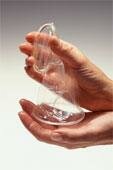BARRIER METHODS
This kind of contraception includes male condoms, female condom, diaphragms, and caps. It prevents sperm entering the uterus. Male condoms are about 98% effective if used properly. Other barrier methods are slightly less effective than condoms.
Some advantages:
• No serious medical risks or side effects,
• Helps protect from sexually transmitted infections,
• Condoms are widely available.
Some disadvantages:
• Not quite as reliable as other methods,
• Needs to be used properly every time you have sex,
• Male condoms occasionally split or come off. |
 |
 |
INTRAUTERIN DEVICE (IUD)
A plastic and copper device (IUD) is put into the uterus. Lasts 5 or more years. It works mainly by stopping the egg and sperm from meeting. It may also prevent the fertilized egg from attaching to the lining of the uterus. The copper also has a spermicidal effect (kills spermatozoids).
Some advantages:
• Very effective,
• Don't need any attention or every day management.
Some disadvantages:
• Periods may get heavier or more painful,
• Small risk of serious problems. |
 |
Hormone releasing intrauterine device (eg Mirena)
Otherwise called the intrauterine system (IUS). A plastic device that contains a progestogen hormone is put into the uterus. The progestogen is released at a slow but constant rate. Effectiveness about 99%. Works in a similar way to the Progesteron Only Pills. It is also used to treat heavy periods (menorrhagia).
Some advantages:
• Very effective,
• Don't need any attention or every day management,
• Periods become light or stop altogether.
Some disadvantages:
• Side-effects may occur as with other progestogen methods. |
 |
NATURAL METHODS
This method of contraception involves fertility awareness. Effective - if done correctly. Requires commitment and regular checking of fertility indicators such as body temperature and cervical secretions.
Some advantages:
• No side-effects or medical risks.
Some disadvantages:
• May not be as reliable as other methods,
• Fertility awareness needs proper instruction and takes 3-6 menstrual cycles to learn properly. |
 |
STERILIZATION
This method of contraception requires the operation. It is more than 99% effective. Vasectomy (male sterilization) stops sperm traveling from the testes. Female sterilization prevents the egg from traveling along the Fallopian tubes to meet a sperm. Vasectomy is easier and more effective than female sterilization. Popular for people with complete family.
Some advantages
• Very effective,
• Don't have to think further about contraception.
Some disadvantages:
• Very difficult to reverse,
• Female sterilization usually needs a general anesthetic. |
 |
PLAN B - EMERGENCY CONTRACEPTION - Morning After Pills
Can be used after unplanned unprotected sex or if you had sex but there was a mistake with contraception. For example: split condom, missed pills, etc.
Plan B (Emergency contraception pills) - are usually effective if started within 72 hours after unprotected sex. Can be bought at pharmacies or prescribed by a doctor. It works either by preventing or postponing ovulation, or by preventing the fertilized egg from settling in the uterus (womb).
As a Plan B the IUD also can be used. IUD can be inserted during 5 days after unprotected sex.
General information about modern contraception, all methods of hormonal contraception, intrauterine devices (IUDs), sterilization, natural methods, dual contraception and emergency contraception you can discover in following pages - Contraception (Part I) and (Part II).
|